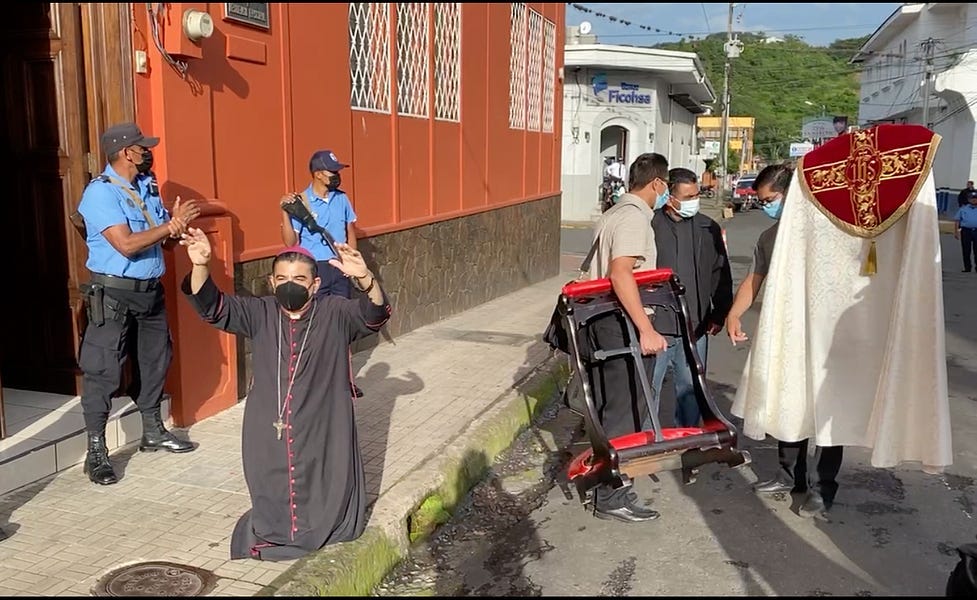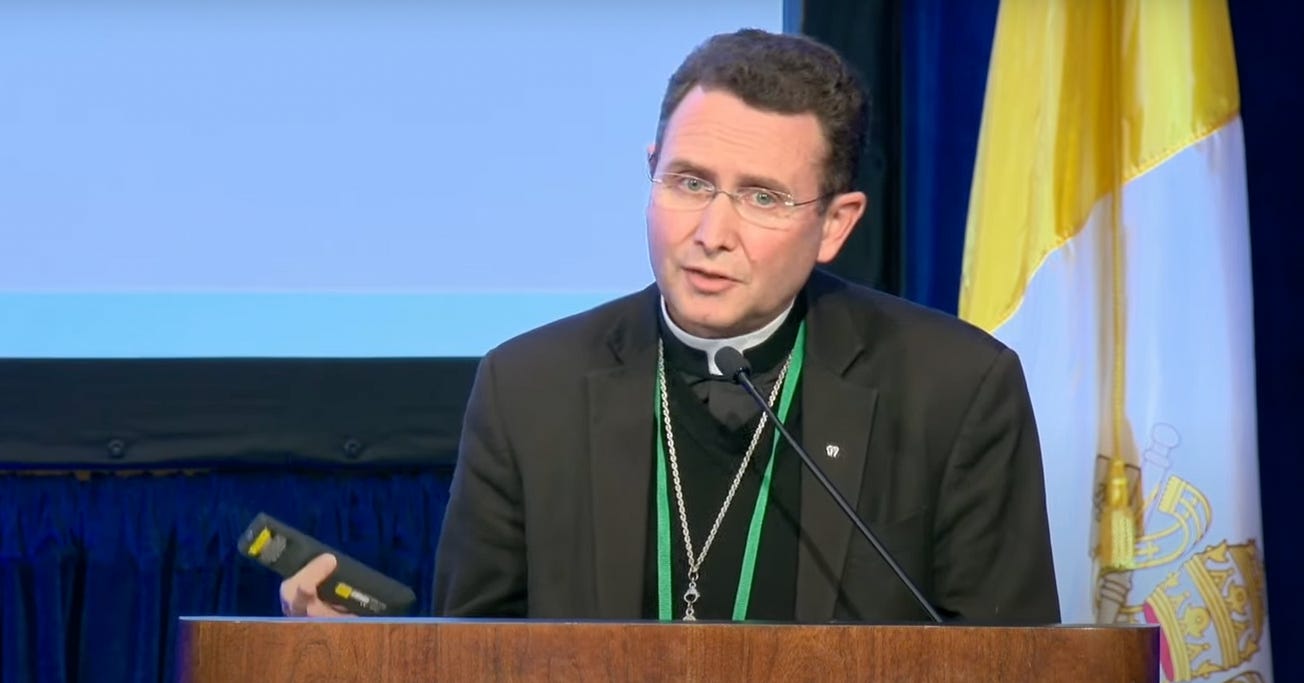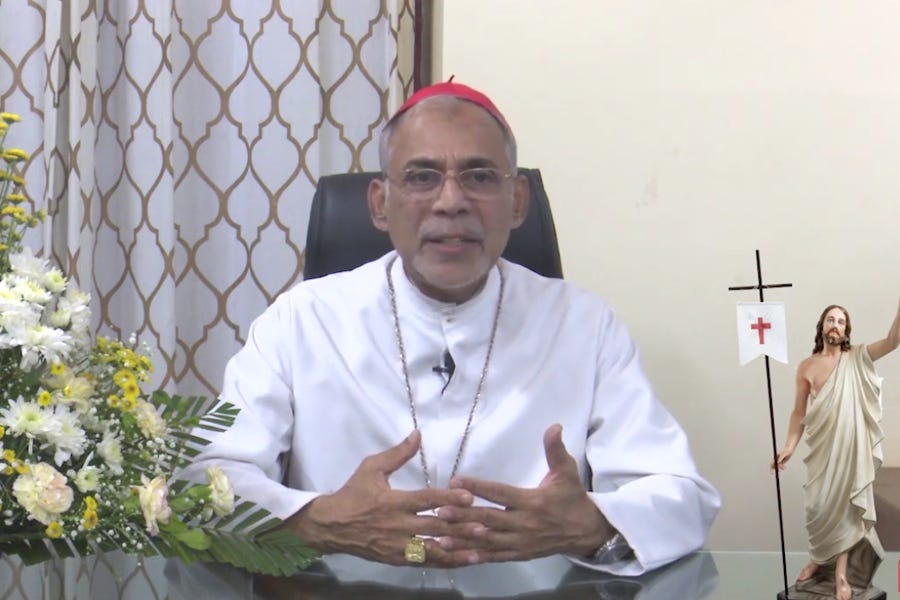
After years of persecution by the Nicaraguan government, the year 2022 has been a “disaster” for the Church in that country, according to the lawyer and human rights advocate who compiled an exhaustive study of the issue.
Martha Molina, author of a recently updated report on government persecution in that country, told The Pillar that the Church is now the “last bastion” opposing oppression in Nicarague, and should expect to come under even more attacks.
After studying the actions of the regime of President José Daniel Ortega Saavedra, Molina published in May 2022 “Nicaragua: Una Iglesia Perseguida,” her record of the government’s treatment of the Church.
The study covered a period of nearly four years and documented 190 attacks against the Church, ranging from defamation and harassment, to exile, torture, and imprisonment.
But with the situation in the country deteriorating fast, barely six months later, Molina had to issue a second volume last month, bringing the total of persecution acts against the Church up to nearly 400.
Bishop Rolando Álvarez of Matagalpa was charged last week with conspiracy against the Nicaraguan state. The bishop is set to face trial next month, in what has become the marquee case of persecution against the Church in the country.
Already this year, the Nicaraguan regime has exiled the country’s papal nuncio, the Missionaries of Charity, and the Sisters of the Cross and the Sacred Heart. Twelve priests, two seminarians, and a handful of laypeople who worked with the Diocese of Matagalpa have been imprisoned and charged with conspiracy.
Eight Nicaraguan priests have publicly announced they have gone into exile or that they were not allowed to return to the country, though human rights organizations point out that the number might be as high as 55 exiled priests.
In an interview with The Pillar, Molina said that “the multiple aggressions that the Nicaraguan dictatorship has carried out against the Catholic Church” made it “necessary to organize all this information and compile it in a single document in a systematized way.”
She spoke with The Pillar via Zoom about her report, the future of the persecution in Nicaragua, and the role of the country’s bishops’ conference.
This interview has been edited for length and clarity.
The first volume of your report was published in May and it compiles actions by the government from 2018.
What has changed in Nicaragua so that, after just six months, you published a second volume? The first volume covered four years, and the second covered only six months — what changed?
It’s simple, 127 of a total 396 attacks happened in 2022. This year has been the most disastrous for the Catholic Church in terms of persecution.
Persecution has increased, not only against priests and bishops but also against lay Catholics. For example, on Dec. 11, two Catholic journalists were imprisoned due to their work with Bishop Rolando Álvarez of the Diocese of Matagalpa.
The persecution is because the Catholic Church is the last bastion left in Nicaragua. They took the media, the institutions, the political parties, and the NGOs, so the only space left is the Church. Thus, the dictatorship intends to eradicate [the Church] completely, so that the prophetic voice of the Gospel is not heard by the Nicaraguan people.
One cannot preach the Gospel faithfully and be silent about injustice.
And this makes the dictatorship uncomfortable because they only want social actors who flatter them and applaud all their abuses. Well, the Catholic Church is not willing to flatter anyone who is abusing the people. That's why the dictatorship in recent times has increased persecution against the Catholic Church: it's the only thing left standing.
And what is so special about the Catholic Church in Nicaragua that makes it such a direct target of the Ortega regime today?
The clergy have been faithful witnesses to the Gospel. They have brought a message of hope and of peace to the Nicaraguan people. And their deeds have followed their words. They have opened the doors of the different churches to welcome all those who have suffered persecution and who have had their relatives murdered.
The priests have gone to visit the people who are suffering persecution because they denounce injustices in the light of the Gospel.
And this is precisely what the Sandinista dictatorship does not want. They want them to remain silent, to not denounce the arbitrary acts. But the very spirit of the Gospel compels us to denounce these abuses.
So, I guess the only option for the dictatorship is to burn all the bibles because the only thing that priests do is read the Gospel and explain what is happening in their homilies. The Gospel is liberating and thus is a force to denounce the abuses in Nicaragua.
The persecution against the Church began in 2018 with the massive protests that year. But this year it seems to have reached a new level.
What changed this year that caused the Ortega regime to reach a new level of persecution against the Church?
The dictatorship has completely eradicated all democratic spaces, that is, civil and non-profit organizations, the media, and non-violent civic protests. Since the only thing left is the Catholic Church, the dictatorship has set its sights on these activities taking place within the church. Simple things such as a Mass or praying the rosary or a priest preaching the Gospel bother the dictatorship today.
Likewise, the methods of persecution have escalated. At first, the attacks were graffiti with messages of hatred on the walls of churches, or damages to property. The regime defamed priests and bishops and lay Catholics were constantly harassed. But this time, in this new stage of persecution, the dictatorship is using different mechanisms.
For example, almost all Catholic media was shut down. All religious non-profit organizations have been arbitrarily shut down. It has initiated illegal criminal proceedings against priests and bishops. We have a bishop who has been kidnapped for more than 120 days Bishop Rolando José Álvarez [who is now facing charges and trial]. And this is the new stage of the dictatorship in persecution against the Catholic Church in Nicaragua.
📰
Ortega and the Sandinistas also ruled Nicaragua in the 1980s, which was another time of persecution against the Church.
What difference is there between the persecution then and what the Church in Nicaragua is going through now?
The persecution we experienced in the 1980s is similar to the persecution today. The big difference is that in the 1980s there were no criminal proceedings against priests. They were not kidnapped and they were not imprisoned. In this new stage of persecution, it's something we're seeing frequently.
So Sandinismo is now much more aggressive against the Catholic Church.
Part of the persecution in the 1980s was legitimized internally because a sector of the Church influenced by Marxism and liberation theology supported and even participated in the government, such as the Cardenal brothers.
Are there also government collaborators today at a high level in the Church in Nicaragua?
Not at the same level. There are some priests who are ideologically close to the regime, but this does not mean that they publicly applaud or justify the attacks against the Church, the murder of dissidents, the tortures, etc.
This handful of priests that are close to Sandinismo, who can be counted on the fingers of the left hand, are not actively promoting these human rights violations. But they have their personal convictions. I don't know why, they might have their own particular reasons, but it is not like they are publicly blessing and supporting the abuses.
Your report details 396 cases of persecution against bishops, priests, deacons, seminarians, religious, lay people, and all kinds of Catholics in Nicaragua, ranging from defamation to torture, imprisonment, and exile.
For a person who doesn't know what the situation is like in Nicaragua today, how would you explain what it's like to be a Catholic faithful to the Gospel in Nicaragua today?
Well, being a Catholic in Nicaragua is an extremely dangerous affair. Praying the rosary or attending Catholic activities can be seen as an act of terrorism in my country. Nicaragua is a criminal state that has completely abolished all democratic spaces. There is no division of powers in Nicaragua. In addition, we have two institutions that are absolutely submissive to the whim of the presidential couple, Ortega and his wife Rosario Murillo: the national police and the Nicaraguan army. These two institutions are willing to murder, torture, and disappear people.
All of this goes unpunished, as we have observed in these last four years of civic struggle. Being Catholic is dangerous because the dictatorship doesn't see Nicaraguan Catholics in a good light.
The emblem of the persecution and violation of human rights and in particular against the Church in Nicaragua is the El Chipote prison.
What happens there?
Torture is common in El Chipote. I have a study that confirms 38 mechanisms of torture carried out in different prisons in Nicaragua and mainly in the one known as El Chipote.
It is a terrifying prison. And that's where the worst mechanisms of torture are practiced on political prisoners. That is where Nicaraguan priests and seminarians are currently imprisoned. We don't know what kind of torture they are being subjected to at the moment.
But yes, El Chipote is well known for being a torture center. The people who have eventually left the facility, have talked about the horrors committed daily in this place. Ironically, the laws of Nicaragua strongly condemn torture.
What kind of intelligence mechanisms does the dictatorship use to persecute or study or monitor priests? Are they infiltrating people inside the Church? Are they surveilling priests in their parishes?
The case of Fr. Óscar Benavides was very curious because he preached a homily critical of Ortega and the police took him into custody when he left the parish after Mass.
The Sandinista National Liberation Front is a terrorist organization that has infiltrated its followers in all institutions, including, the Catholic Church.
Several lay people are sympathetic to the dictatorship and are also members of the Church. At the same time, they are in charge of recording all the information they can within the Catholic Church, such as homilies or meetings with priests and Church officials, to provide it to Sandinismo.
This is well known in Nicaragua because we’re a small country. We all know each other and are all linked in one way or another. So, we already know who is who. People know who members of the CPC are, which is a group of people who support Sandinismo and work with their paramilitary forces by supervising members of the opposition, including, in this case, priests. So, they listen to the homilies, take photos, record them, etc. in an attempt to frame them. And clearly, it is easy to find “rebellion” against the regime, because the Gospel is never silent about injustice, so the priests cannot stop denouncing abuses.
Sandinismo does have people infiltrated within the Catholic Church, and not only among those who come sporadically, but allegedly committed lay people who are taking information from the Catholic Church to the dictatorship.
How have you seen the bishops' conference's attitude to the regime evolve between 2018 and today?
The bishops' conference at this moment is maintaining absolute silence. I don't want to say that it is an accomplice's silence. It’s not easy to deal with persecution at this level, where the state, which should be the guarantor and protector of the human rights of each Nicaraguan citizen, puts a bullseye on your back.
The Catholic Church and the Nicaraguan Bishops' Conference are now confronting an omnipotent power that can and will do everything to destroy the Church. Sandinismo has passed absolutely all limits.
So, I think that, at this moment, the bishops' conference is remaining silent, not only out of fear, but also because there is some strategy involved. As a Catholic, I always hope that the bishops' conference will call out injustice by name and that, for example, they will not say that Bishop Rolando Álvarez is “in a place,” but that they will tell the truth: Bishop Rolando Álvarez has been forcibly “disappeared” for more than 120 days.
I understand the prudence behind their statements. But as the face of the Catholic Church in Nicaragua, they should call things by their name.
What legal changes have allowed Ortega to legalize persecution against the Church?
Under what legal mechanisms are priests and lay members of the Church being incriminated today?
Sandinismo has been changing the justice system and also the laws. They have promoted and promulgated laws at their convenience, and all the powers of the state, the electoral, the judicial, and the legislative branch are so submissive to the dictatorship that whatever Daniel Ortega and Rosario Murillo say is the law. So that's how the law is applied.
But I wouldn’t focus too much on that. At this stage, they are not even using the unconstitutional laws that they have enacted.
For example, Bishop Álvarez was [initially] detained and taken to an undisclosed location. They created a law that allows the national police and the public prosecutor's office to have someone in custody without pressing charges for 90 days to investigate, if a judge authorizes it — this is already unconstitutional and an abuse. But Bishop Álvarez was effectively kidnapped for 120 days [before being charged], so they’re not even complying with their own unconstitutional, unjust laws.
So, Nicaragua is the law of the jungle, the law of the strongest. The judges don't even take care to read what the criminal and procedural laws say. They only receive orders from the regime, and that's what they apply.
Defendants don’t even have the right to choose their attorney, but the state itself imposes a public defender on them that typically just does what the DA wants them to do. So, you have a judge, a public defender, and a public prosecutor against the defendant, who is actually a victim.
Do you think there is any possibility of a productive dialogue between the Church and the regime in Nicaragua?
This is an issue that has been very controversial internally in my country. As a Catholic, I would never expect the Catholic Church to call for anything other than dialogue. The Catholic Church is never going to say, "Let's go to war,” and as a Catholic, I wouldn't accept that, and I just can't get my head around something like that.
So that's why the Catholic Church is seeking a dialogue with Sandinismo, but Sandinismo has no political will to sit down to dialogue, and even less so when its interlocutor is the Catholic Church.
📰
The Pillar relies on subscribers, and subscribers rely on us. If you know good journalism is worth paying for, subscribe today – or upgrade your subscription!
We saw recently how they expelled the apostolic nuncio. Would they do that if they wanted to have a dialogue? Sandinismo has no need for dialogue because they can do whatever they want.
They have the army, they have the police, who are ready to kill and torture. And we have a double-faced international community that, on the one hand, is condemning the dictatorship. But on the other hand, they are constantly injecting money through multilateral organizations, which is not being used for the benefit of Nicaraguan society, but for its repression. This year, the legislative branch approved an exhaustive budget for the national police and the army. We know that it's for repression.
Was this year the peak for persecution or do you think it is just the beginning of much worse persecution against the Church in Nicaragua?
A nefarious persecution promoted by the socialist dictatorship awaits the Catholic Church next year — it could be as bad as this one because Sandinismo is trying to eradicate the Catholic Church. Whether it will succeed is another matter.
We know it won't because the Catholic Church is an institution that has remained firm throughout the centuries and no earthly power has destroyed it. It was instituted by our Lord Jesus Christ and a petty dictatorship is not going to eradicate it.
Yes, the regime is doing absolutely everything it can to cause the most damage, but we already knew this would happen. If we are faithful witnesses of the Gospel and call out injustice, we are going to be persecuted.




